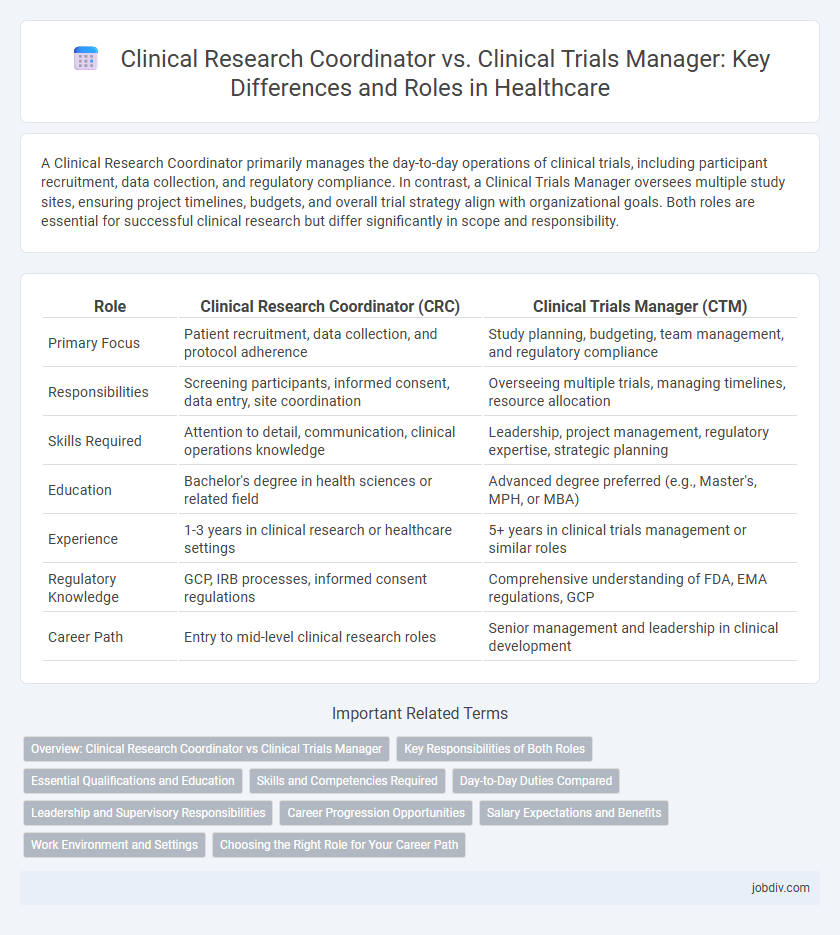A Clinical Research Coordinator primarily manages the day-to-day operations of clinical trials, including participant recruitment, data collection, and regulatory compliance. In contrast, a Clinical Trials Manager oversees multiple study sites, ensuring project timelines, budgets, and overall trial strategy align with organizational goals. Both roles are essential for successful clinical research but differ significantly in scope and responsibility.
Table of Comparison
| Role | Clinical Research Coordinator (CRC) | Clinical Trials Manager (CTM) |
|---|---|---|
| Primary Focus | Patient recruitment, data collection, and protocol adherence | Study planning, budgeting, team management, and regulatory compliance |
| Responsibilities | Screening participants, informed consent, data entry, site coordination | Overseeing multiple trials, managing timelines, resource allocation |
| Skills Required | Attention to detail, communication, clinical operations knowledge | Leadership, project management, regulatory expertise, strategic planning |
| Education | Bachelor's degree in health sciences or related field | Advanced degree preferred (e.g., Master's, MPH, or MBA) |
| Experience | 1-3 years in clinical research or healthcare settings | 5+ years in clinical trials management or similar roles |
| Regulatory Knowledge | GCP, IRB processes, informed consent regulations | Comprehensive understanding of FDA, EMA regulations, GCP |
| Career Path | Entry to mid-level clinical research roles | Senior management and leadership in clinical development |
Overview: Clinical Research Coordinator vs Clinical Trials Manager
A Clinical Research Coordinator (CRC) oversees day-to-day clinical trial operations, ensuring compliance with protocols, managing patient recruitment, and maintaining accurate documentation. In contrast, a Clinical Trials Manager (CTM) is responsible for the overall planning, execution, and management of clinical trials, including budgeting, regulatory submissions, and cross-functional team coordination. Both roles are essential in clinical research, with CRCs focusing on operational details and CTMs driving strategic oversight to ensure successful trial completion.
Key Responsibilities of Both Roles
Clinical Research Coordinators manage daily operations of clinical trials including patient recruitment, data collection, and regulatory compliance to ensure protocol adherence. Clinical Trials Managers oversee overall study planning, budgeting, and team coordination while ensuring trial timelines and quality standards are met. Both roles collaborate closely to guarantee successful execution and integrity of clinical research projects.
Essential Qualifications and Education
Clinical Research Coordinators typically require a bachelor's degree in life sciences or allied health fields, coupled with certifications like CCRC to manage study protocols and patient interactions effectively. Clinical Trials Managers often hold advanced degrees such as a master's or PhD in clinical research, public health, or related disciplines, alongside extensive experience in project management and regulatory compliance. Essential qualifications for both roles include strong knowledge of Good Clinical Practice (GCP) guidelines, ethical standards, and proficiency in clinical data management systems.
Skills and Competencies Required
Clinical Research Coordinators require strong organizational skills, attention to detail, and proficiency in patient communication and regulatory compliance to effectively manage day-to-day trial activities. Clinical Trials Managers need advanced leadership abilities, strategic planning expertise, and comprehensive knowledge of trial protocol development and budget management to oversee multiple clinical studies. Both roles demand a deep understanding of Good Clinical Practice (GCP) guidelines and data integrity principles to ensure successful clinical trial execution.
Day-to-Day Duties Compared
Clinical Research Coordinators primarily handle participant recruitment, consent documentation, and data collection to ensure compliance with study protocols. Clinical Trials Managers oversee multiple studies, managing budgets, timelines, and regulatory submissions to maintain overall trial progress. Both roles require strong communication skills, but Coordinators focus on operational tasks, while Managers emphasize strategic oversight and team coordination.
Leadership and Supervisory Responsibilities
Clinical Research Coordinators (CRCs) primarily oversee day-to-day clinical trial operations, managing participant recruitment, data collection, and protocol adherence, ensuring compliance with regulatory standards. Clinical Trials Managers (CTMs) hold higher leadership roles, supervising multiple study teams, developing project timelines, budget management, and coordinating with sponsors to align trial strategies and objectives. CTMs demonstrate stronger strategic decision-making and team leadership skills, while CRCs focus on operational execution and direct participant management.
Career Progression Opportunities
Clinical Research Coordinators typically gain hands-on experience managing patient recruitment, data collection, and regulatory compliance, which builds essential skills for advancing to Clinical Trials Manager roles. Clinical Trials Managers oversee multiple studies, coordinate teams, manage budgets, and ensure protocol adherence, making this position a natural progression that offers increased leadership responsibilities and higher salary potential. Career progression from Coordinator to Manager often involves developing strong project management expertise, gaining certifications like Certified Clinical Research Professional (CCRP), and demonstrating the ability to lead complex clinical trial operations.
Salary Expectations and Benefits
Clinical Research Coordinators typically earn between $50,000 and $70,000 annually, while Clinical Trials Managers command higher salaries ranging from $80,000 to $120,000 due to increased responsibilities and leadership roles. Benefits for both positions often include health insurance, retirement plans, and paid time off, but Clinical Trials Managers may receive additional bonuses and stock options linked to project success. Salary expectations vary by location, level of experience, and the complexity of clinical trials overseen.
Work Environment and Settings
Clinical Research Coordinators typically work in hospital settings, research institutions, or academic medical centers where they directly manage patient interactions and data collection. Clinical Trials Managers often operate within pharmaceutical companies or contract research organizations (CROs), overseeing multiple trial sites and coordinating project timelines remotely or from corporate offices. Both roles require collaboration with regulatory bodies and adherence to strict compliance standards, but their primary environments differ by level of operational scope and on-site presence.
Choosing the Right Role for Your Career Path
Clinical Research Coordinators focus on managing day-to-day trial operations, participant recruitment, and data collection, making this role ideal for detail-oriented professionals who enjoy direct interaction with study participants. Clinical Trials Managers oversee multiple studies, coordinate cross-functional teams, and ensure compliance with regulatory standards, suited for those aiming to lead complex projects and strategic planning in clinical research. Selecting the right career path depends on whether you prefer hands-on trial execution or leadership responsibilities within clinical research management.
Clinical Research Coordinator vs Clinical Trials Manager Infographic

 jobdiv.com
jobdiv.com